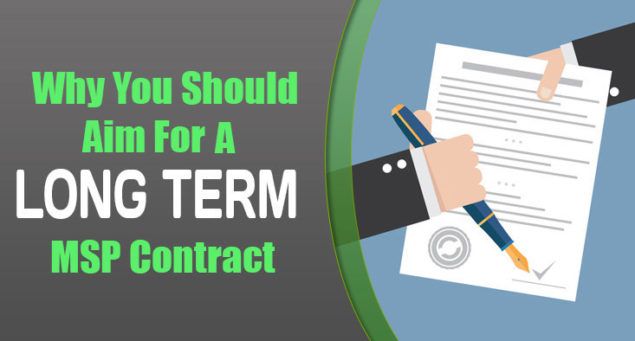- You are here:
- Home »
- Blog »
- MSP Management »
- Why You Should Aim for a Long Term MSP Contract

Why You Should Aim for a Long Term MSP Contract
When you bring in new clients, you naturally want them to stick around for a long time. That’s how business should go. But there’s a rising popularity of short-term MSP contracts, and managed service providers are quick to pick up on this. A common reasoning is that there’s no need to worry about a client bailing out on you if your service is excellent. But will your top-quality service be enough to keep them around?
Here are several reasons why a long term contract is good business strategy.
Your Onboarding Cost
Your business tools such as your RMM, PSA, and other utilities, do not come for free. And you’ll be able to regain the costs for this software if your clients enlist your services for longer. It’s not only that, installing these programs onto your client’s network takes time too. What happens if your client develops a habit of changing managed service providers every three months? That would mean cleaning and setting up their network four times in a year. The labor cost for that is simply impractical for business, unless you have an installation charge in place.
If you purchased new hardware for your client’s line of business, you would need to recoup that cost. A longer contract will allow you to do this, spreading the payment in easy and lighter terms. This goes the same for applications you install into the network. Some of these need licenses purchased with a yearly subscription. Although you can opt to pro-rate your prices, having a long term agreement gives security that you will recoup your cost and gain profit.
Think also of the labor you need to make an inventory of your client’s network. You would need to take note of IP addresses, VPN logins, and even label PCs for documentation. You would have to configure all network peripherals, web applications, and backup devices. This could take days, or even weeks to accomplish. How would it be profitable for you if you do this process for your client 2-3 times a year?
Benefits of Long Term Contract
Predictable revenue. If you have a client locked into a 3-5 year contract, you can rely on a steady stream of revenue coming from that client. You are guaranteed to have their business, so long as you fulfill the requirements. Being able to forecast your guaranteed revenue can help you map out the progress of your business and predict where you will be going forward.
More time to negotiate renewals. Being able to negotiate a new contract with your clients up to a year before it runs out allows you to retain their business. Either you reiterate the benefits of going with your business, match whatever offers they have received, or offer price breaks later. Your clients are also more likely to agree into a multi-year contract when they know that they won’t experience price hikes down the line.
Lower chance of losing clients to competition. If you’re operating on short-term contracts, you’re giving your competition repeat chances to steal your clients. If you are operating on one year deals or shorter, your competitors will have a new chance to steal your client each and every time your short-term contract runs out. But if you sign 2-5 year deals with your customers, this gives your competitors a lesser chance to take your business away.
Increased efficiency and communication. The longer you provide service to your clients, the better you understand their business. This will allow greater integration of business, IT and financial processes. As a consequence, your service will improve and become more efficient. The “gray areas” disappear and any issues which do arise can be handled more effectively.
Put a Good Exit Plan in your MSP Contract
All expectations should be well defined from the start. This is why you need to have a solid contract to begin with. Get everything covered, don’t leave anything out. But one equally important part of a long term contract is the exit clause. You would need to work closely with your client so it can be a win-win.
Don’t just assume what your clients are greatly concerned of. If they seem reluctant, it’s best to ask them what’s holding them back. Every business is unique, with different needs. You might be surprised with the answers. For example, their concern could be about what happens if they close the business within the contract term. This is where you sit down with your client to work out a solution. Are they expected to pay the remaining value of the contract? If yes, will it be the full amount, or will they be given consideration and need to pay just a percentage? Then this agreement should be included in the contract. Having this kind of arrangement dispels their feeling of being trapped in a long term agreement.
